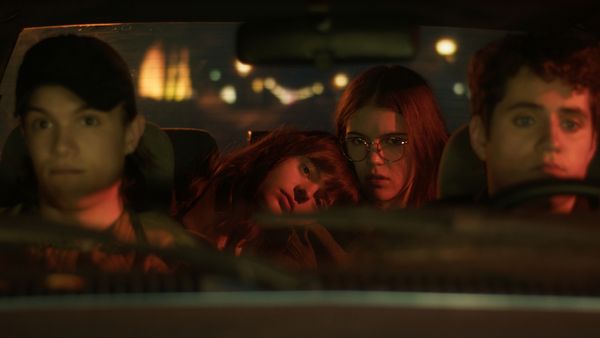Eye For Film >> Movies >> You Can Live Forever (2022) Film Review
You Can Live Forever
Reviewed by: Jennie Kermode

Stories about the obstacles which some kinds of religious beliefs can create in LGBTQ+ people’s lives are frequently people with monsters – unreasoning tyrants who get their way with threats or ultimatums. Although these people certainly do exist in real life, the majority of situations are more nuanced. Struggles have an internal dimension, faith is not a thing which can be casually given up, and romantic love does not always emerge as the most important thing. With echoes of Sebastián Lelio’s Disobedience, this thoughtful little indie explores a romance in which one girl must contend with being an outsider whilst the other must weigh up the risk of forfeiting eternal life.
The former of these is Jaime (Anwen O’Driscoll), who is sent to live with her aunt, a Jehovah’s Witness, following the death of her father. Though she’s obviously in a difficult place emotionally, she makes a valiant effort to fit in and show respect for those around her, pleased that her aunt isn’t push about her religion. There is an expectation that Jaime will attend some community meetings to see what it’s all about, but various adults assert that nobody should choose that life until they have had time to think about it and be sure that it’s for them. The only real indignity Jaime faces is being required to wear twee floral dresses, but these are only for formal occasions. The school she’s sent to is secular and she has a lot of freedom to live life on her own terms.

One thing Jamie doesn’t tell her aunt is that she’s a lesbian. She doesn’t tell new friend Nathan (Hasani Freeman) either, and there’s a hint that he might have a bit of a crush on her, but friendship comes first – he’s not “living the in the truth” as her new community puts it, so she can hang out at his place and play video games. Marike (June Laporte), a girl from the community who adopts her as a new best friend in that over-eager way that young teenagers sometimes do, doesn’t know what a video game is. Nevertheless, her forceful personality sees her exert quite a hold over Jaime long before feelings between the two of them start to get complicated.
A delicate balance is achieved here between telling the girls’ story, exploring the role which Marike’s religion and culture play in her life, and critiquing aspects of the way she is expected to live. Most of the critique comes at the end, but even then, it’s delivered with a rare subtlety and grace. The truth, as she perceives it, is a real, tangible thing to Marike, and the same seems to apply to all the Jehovah’s Witnesses we meet. They are not faking it or using it first and foremost as a means of exerting power over others. We see no signs of hypocrisy amongst them. As a result of this, what we get is not just another film about picking a side, but a portrait of one girl torn between choosing life or love, while another must deal with the realisation that this is the effect her presence is having on someone she loves.
The different mindsets involved here also complicate the central relationship itself, suggesting that, whilst romantic love and desire may develop in a natural way, it takes a conscious effort to achieve mutual understanding. Both girls are growing up and puzzling out their own identities as well as one another’s. Directors Mark Slutsky and Sarah Watts handle this aspect of the story with sensitivity and never patronise their characters. They elicit impressive, risk-taking performances from both leads, giving viewers of all ages a real sense of connection to what they’re going through. The result is a film which invites questions and builds empathy even whilst it shows plainly the insidious harm which being unable to reconcile one’s belief system with one’s innate nature can do.
Reviewed on: 24 Jul 2022
















